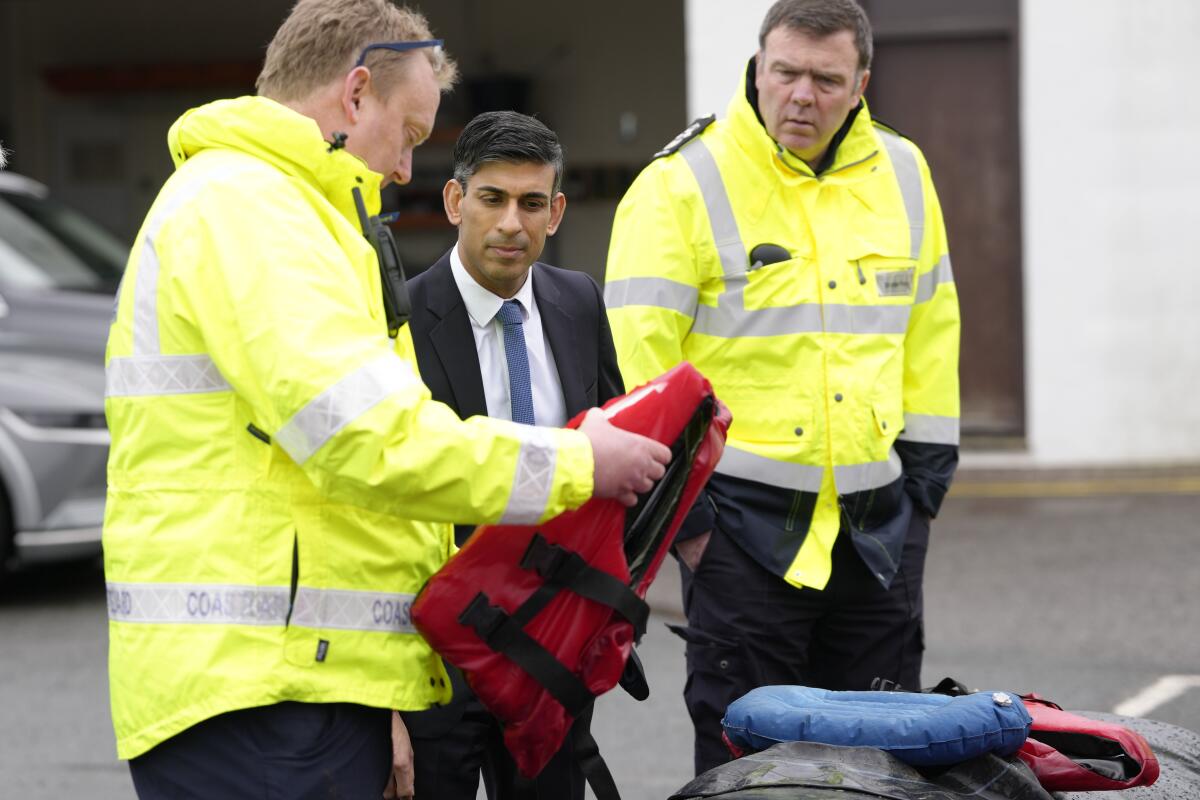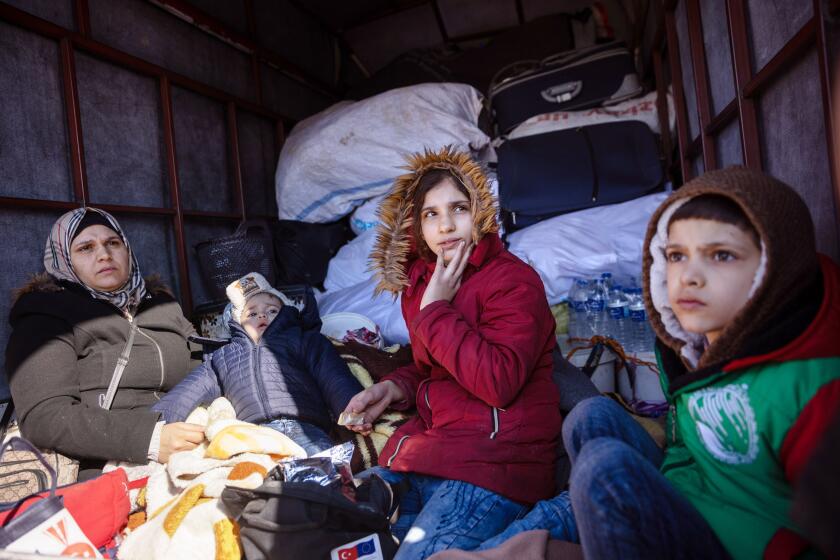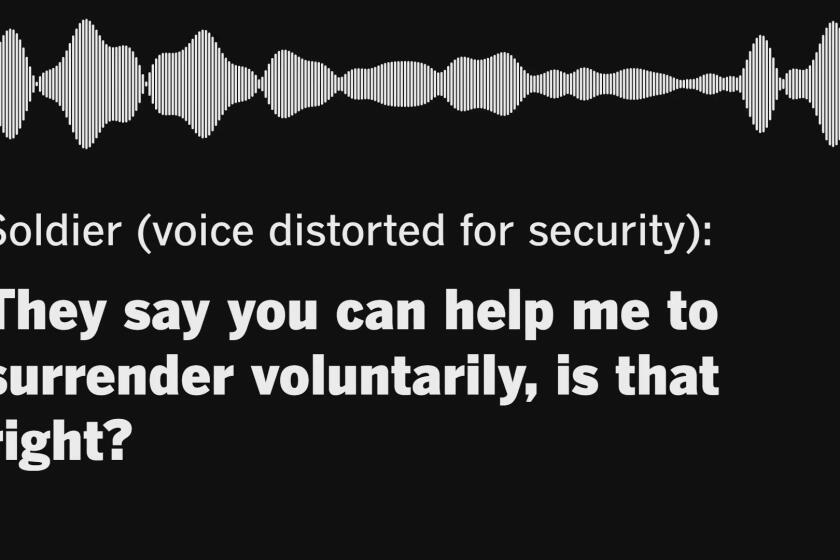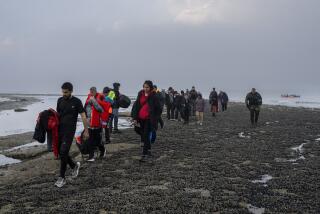U.K. pushes plan to deport migrants who cross the English Channel

- Share via
LONDON — The British government said Tuesday that it was ready for human-rights legal challenges to a tough new law intended to stop tens of thousands of migrants a year from reaching the country in small boats across the English Channel.
Home Secretary Suella Braverman said the government had “pushed the boundaries of international law” with a bill that will bar asylum claims by anyone who reaches the U.K. by unauthorized means, and will compel the government to detain and then deport them “to their home country or a safe third country.” They would be banned from ever reentering the country.
“If you enter Britain illegally, you will be detained and swiftly removed,” Braverman told lawmakers in the House of Commons as she introduced the government’s “Illegal Migration Bill.”
But critics said the plan is unethical and unworkable, since people fleeing war and persecution can’t be sent home, and is likely to be the latest in a series of unfulfilled immigration pledges by successive U.K. governments.
“There is nothing fair, humane or even practical in this plan, and it’s frankly chilling to see ministers trying to remove human rights protections for groups of people whom they’ve chosen to scapegoat for their own failures,” said Steve Valdez-Symonds of Amnesty International.
Mexico kidnapping: Two Americans are killed and two are rescued after being caught in crossfire in a violent border city. It has sparked international tension.
The United Nations’ refugee agency urged British lawmakers to reconsider the plan, saying it would be a “clear breach of the Refugee Convention” and amount to an “asylum ban.”
The government says the new law, once approved by Parliament, will deter migrants and hobble smuggling gangs who send desperate people on hazardous journeys across one of the world’s busiest shipping lanes.
Prime Minister Rishi Sunak said the law would let Britain “take back control” of its borders — a central pledge of the successful but divisive campaign to take Britain out of the European Union.
“The current situation is neither moral nor sustainable,” he said at a news conference, standing at a lectern emblazoned “Stop the Boats.”
“If we can’t stop the boats, our ability to help genuine refugees in future will be constrained.”
The bill calls for people arriving by boat to be detained for 28 days and then deported, with exceptions only for children, those medically unfit to fly and people at risk of serious harm, and with limited grounds for appeal. Migrants who are victims of human trafficking would be barred from using Britain’s modern slavery laws to prevent deportation.
Braverman acknowledged that the “robust and novel” legislation is likely to face legal challenges. She said she was “confident” it is compatible with Britain’s international obligations under refugee and human rights conventions — but acknowledged in a letter to Conservative lawmakers that there is a greater than 50% chance that it isn’t.
Since last week’s earthquake, refugees of Syria’s civil war living in Turkey have faced growing anger from those who see them as a burden and blight.
Enver Solomon, chief executive of the Refugee Council charity, said the British government was “in effect behaving like those countries that show disregard to international human rights conventions, the likes of Myanmar, Russia, Belarus.”
Britain receives fewer asylum-seekers than some European nations such as Italy, Germany or France. But thousands of migrants from around the world travel to northern France each year in hopes of reaching the U.K., drawn by family ties, the English language or the perceived ease of getting a job.
Most attempt the journey in dinghies and other small craft now that authorities have clamped down on other routes such as stowing away on buses or trucks.
More than 45,000 people arrived in Britain by boat in 2022, up from 28,000 in 2021 and 8,500 in 2020. Most went on to claim asylum, but a backlog of more than 160,000 cases has led to many languishing in overcrowded processing centers or hotels, without the right to work.
The British government says many of those making the journey are economic migrants rather than refugees, and points to an upswing last year in arrivals from Albania, a European country that the U.K. considers safe.
Refugee groups say most of the cross-channel arrivals are fleeing war, persecution or famine in countries including Afghanistan, Iran and Iraq. A majority of those whose claims have been processed were granted asylum in the U.K.
Ukraine’s “I Want to Live” hotline instructs Russian soldiers on how to surrender.
The charities say migrants risk the channel crossing because there are few safe, legal ways to reach the U.K.
The British government says that once its new law is in place it will establish more legal paths to asylum, adding to those set up for people from Afghanistan, Hong Kong and Ukraine. But it hasn’t said how many people will be accepted, or when the program will start.
It’s also unclear which, if any, safe countries will be willing to take in people deported from Britain. A plan announced by the U.K. last year to send migrants on a one-way trip to Rwanda is mired in legal challenges. No one has been sent to the East African country, though Britain has already paid Rwanda $170 million under the deal.
Cooperation with France on stopping the migrants’ boats stalled amid Britain’s acrimonious split from the European Union, though relations have improved since Sunak took office in October. The two governments signed an agreement in November to increase police patrols on beaches in northern France, and Sunak hopes to cement further cooperation when he meets French President Emmanuel Macron at a U.K.-France summit on Friday.
Labor Party immigration spokeswoman Yvette Cooper accused the government of “ramping up the rhetoric on refugees” without solving the “deeply damaging chaos” in Britain’s asylum system.
“This bill isn’t a solution,” she said. “It is a con that risks making the chaos even worse.”
More to Read
Sign up for Essential California
The most important California stories and recommendations in your inbox every morning.
You may occasionally receive promotional content from the Los Angeles Times.












